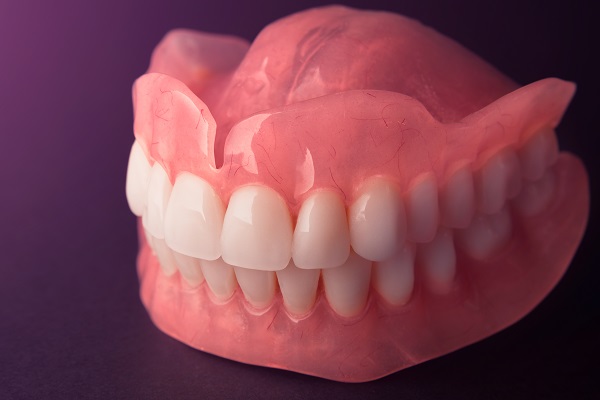Eating With Dentures: How Does it Feel?

Dentures are appliances used to replace natural teeth. Eating with them is not like eating with your regular teeth. Adjusting to eating with new dentures takes a little practice and time. You may have to change how you handle your food.
Eating with dentures
It takes some time to get used to dentures. Fortunately, with some simple strategies, a person can manage them successfully. New denture wearers find that chewing feels different with them. Sometimes, a person may think that food has lost its flavor. While a person is adjusting to wearing them, the mind receives strong signals from the mouth about them, which overpowers messages from the taste buds. After a person becomes accustomed to dentures, the mind will pay more attention to the taste buds and less attention to them.
During the adjustment period, a person may have trouble sensing hot drinks and foods. This is a common problem new denture wearers experience. People should be careful not to burn their mouths. Here are some tips for eating with dentures.
Soft foods
To get used to new dentures, people should start slowly with soft foods, such as fish, eggs, cooked vegetables, puddings and chopped meat. Food should be cut into small pieces or thin strips. Vegetables and fresh fruits should be chopped or sliced into tiny pieces. This will make it easy to chew or cook them before serving.
Chew on both sides
A person should chew slowly using both sides of the mouth. Food should be distributed evenly. A patient should chew half of the food in the mouth on the back-right side and the other half on the back-left side. This will help even out the pressure on the dentures. It will also keep them more stable.
Gaining confidence
Over a few weeks or days, a person will feel more comfortable eating with them. At this point, introducing firmer foods to the diet is encouraged. A person can also try eating chewier foods such as celery and steak. But people are advised to still avoid foods that are extremely hard or sticky and meals that contain sharp bones or shells. This is necessary to avoid damaging the dentures.
What to avoid
People should avoid chewing gum while wearing dentures. Dentures and chewing gum do not often work well together. The gum may stick to the acrylic plastic in the denture and may end up breaking a seal which will loosen them. Gum may also remain stuck to the denture and can eventually harden and discolor. People should also avoid using toothpicks and biting at the front of the mouth when they have dentures in.
Contact your dentist
Eating with dentures may be uncomfortable for a few weeks. Although eating with them is not as convenient as eating with natural teeth, dentures are a good alternative. When you become accustomed to them, you can relax and enjoy a wide variety of foods. If you are thinking about getting dentures, contact your dentist as soon as possible.
Are you considering getting dentures in the Albuquerque area? Get more information at https://familychoicedentistry.com.
Check out what others are saying about our services on Yelp: Read our Yelp reviews.
Related Posts
Sometimes, it takes more than one procedure to get the smile of your dreams. A dental provider can create a custom plan called a smile makeover to enhance different aspects of your smile. It is best to ask a provider if a smile makeover is right for you, as they can give personalized professional advice.…
If your teeth are spaced irregularly, you might not have great self-esteem and may consider trying teeth straightening. Plus, the issue might change your oral hygiene habits. One reason is that food might get stuck in them and be difficult to remove. That can weaken the teeth and gums, leading to complications. Keep reading to…
Dental problems can happen at any time and often require immediate help to relieve pain and avoid potential complications. If you have urgent dental concerns, you might look for an emergency dentist or a same day dentist. Knowing the difference between these dental professionals can help you choose the best option for your needs.An emergency…
A kid-friendly dentist can significantly shape a child's perspective on oral care by making visits pleasant, approachable, and even enjoyable. Early experiences have a lasting effect on a child's attitude toward brushing, flossing, and maintaining routine checkups. When children feel calm and supported during dental appointments, they are more likely to maintain good habits and…
